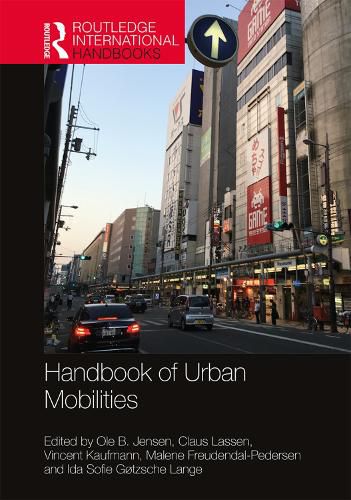Readings Newsletter
Become a Readings Member to make your shopping experience even easier.
Sign in or sign up for free!
You’re not far away from qualifying for FREE standard shipping within Australia
You’ve qualified for FREE standard shipping within Australia
The cart is loading…






This book offers the reader a comprehensive understanding and the multitude of methods utilized in the research of urban mobilities with cities and ‘the urban’ as its pivotal axis. It covers theories and concepts for scholars and researchers to understand, observe and analyse the world of urban mobilities.
The Handbook of Urban Mobilities facilitates the understanding of urban mobilities within a historic conscience of societal transformation. It explores key concepts and theories within the ‘mobilities turn’ with a particular urban framework, as well as the methods and tools at play when empirical, urban mobilities research is undertaken. This book also explores the urban mobilities practices related to commutes; particular modes of moving; the exploration of everyday life and embodied practices as they manifest themselves within urban mobilities; and the themes of power, conflict, and social exclusion. A discussion of urban planning, public control, and governance is also undertaken in the book, wherein the themes of infrastructures, technologies and design are duly considered.
With chapters written in an accessible style, this handbook carries timely contributions within the contemporary state of the art of urban mobilities research. It will thus be useful for academics and students of graduate programmes and post-graduate studies within disciplines such as urban geography, political science, sociology, anthropology, urban planning, traffic and transportation planning, and architecture and urban design.
$9.00 standard shipping within Australia
FREE standard shipping within Australia for orders over $100.00
Express & International shipping calculated at checkout
This book offers the reader a comprehensive understanding and the multitude of methods utilized in the research of urban mobilities with cities and ‘the urban’ as its pivotal axis. It covers theories and concepts for scholars and researchers to understand, observe and analyse the world of urban mobilities.
The Handbook of Urban Mobilities facilitates the understanding of urban mobilities within a historic conscience of societal transformation. It explores key concepts and theories within the ‘mobilities turn’ with a particular urban framework, as well as the methods and tools at play when empirical, urban mobilities research is undertaken. This book also explores the urban mobilities practices related to commutes; particular modes of moving; the exploration of everyday life and embodied practices as they manifest themselves within urban mobilities; and the themes of power, conflict, and social exclusion. A discussion of urban planning, public control, and governance is also undertaken in the book, wherein the themes of infrastructures, technologies and design are duly considered.
With chapters written in an accessible style, this handbook carries timely contributions within the contemporary state of the art of urban mobilities research. It will thus be useful for academics and students of graduate programmes and post-graduate studies within disciplines such as urban geography, political science, sociology, anthropology, urban planning, traffic and transportation planning, and architecture and urban design.